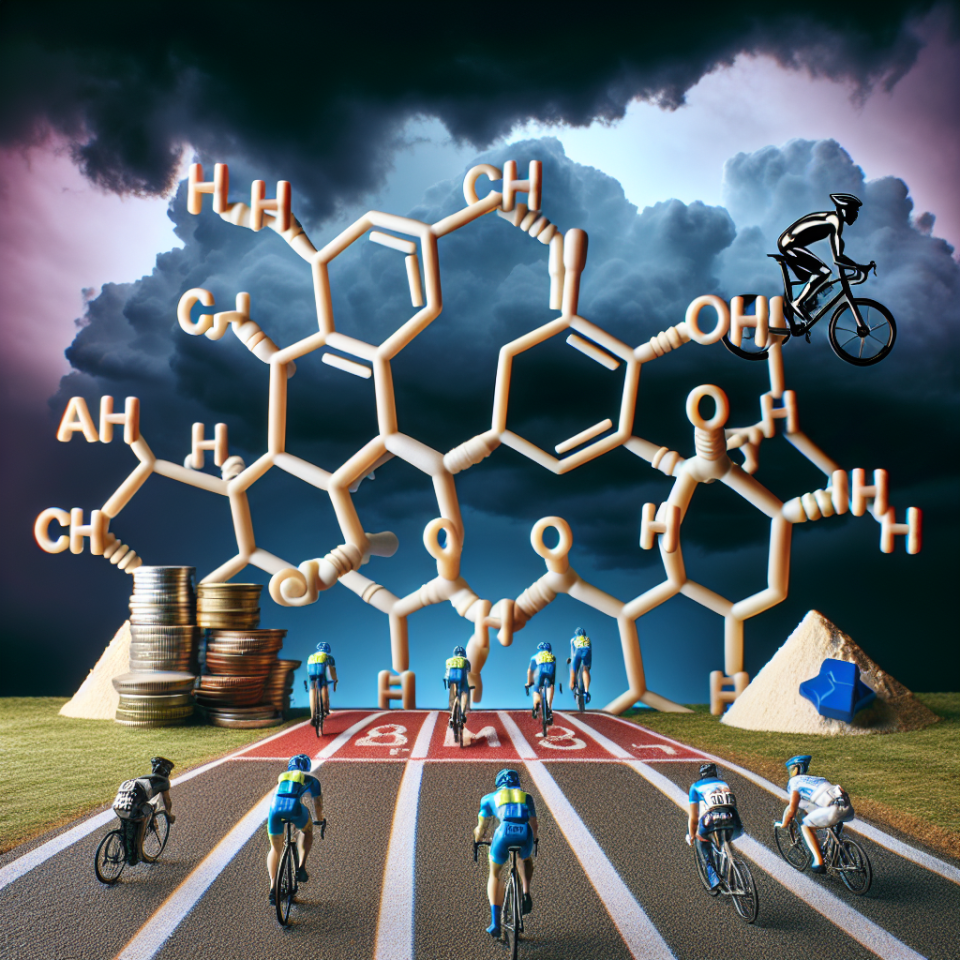-
Table of Contents
Turinabol: The Controversial Drug in Cycling
Cycling is a sport that requires immense physical endurance and strength. Athletes push their bodies to the limit, constantly striving for better performance and results. In such a competitive environment, it is not surprising that some athletes turn to performance-enhancing drugs to gain an edge over their competitors. One such drug that has been at the center of controversy in the cycling world is Turinabol.
The History of Turinabol
Turinabol, also known as Tbol, is an anabolic androgenic steroid (AAS) that was developed in the 1960s by the East German pharmaceutical company, Jenapharm. It was initially used to enhance the performance of East German athletes, particularly in the Olympic Games. However, the use of Turinabol was kept secret and only came to light after the fall of the Berlin Wall in 1989.
Since then, Turinabol has been banned by various sports organizations, including the International Olympic Committee (IOC) and the World Anti-Doping Agency (WADA). Despite its ban, Turinabol continues to be used by some athletes, especially in the cycling world.
The Pharmacology of Turinabol
Turinabol is a modified form of Dianabol, another popular AAS. It has a 4-chloro substitution on the A-ring, which makes it less androgenic and more anabolic than Dianabol. This modification also makes Turinabol less likely to convert to estrogen, reducing the risk of estrogenic side effects such as gynecomastia.
Turinabol has a half-life of 16 hours, which means it stays in the body for a relatively long time. This makes it a popular choice among athletes as it can be detected in urine for up to 6 weeks after use. However, the detection of Turinabol in urine is not straightforward, and specialized testing is required to detect its metabolites.
The Effects of Turinabol on Performance
Turinabol is primarily used by athletes to increase muscle mass, strength, and endurance. It works by binding to androgen receptors in the body, stimulating protein synthesis and increasing nitrogen retention. This leads to an increase in muscle mass and strength, making it an attractive drug for athletes looking to improve their performance.
Studies have shown that Turinabol can increase muscle mass by up to 5-10 pounds in a 6-week cycle (Kicman & Gower, 2003). It also has a positive effect on endurance, allowing athletes to train harder and longer without experiencing fatigue. This makes it a popular choice among cyclists who need to maintain high levels of endurance during long races.
The Side Effects of Turinabol
Like all AAS, Turinabol comes with a range of potential side effects. These include acne, hair loss, increased body hair, and changes in libido. However, the most concerning side effect of Turinabol is its potential to cause liver damage. Studies have shown that Turinabol can increase liver enzymes, which can lead to liver damage if used for extended periods (Kicman & Gower, 2003).
Another potential side effect of Turinabol is its impact on cholesterol levels. It can decrease levels of good cholesterol (HDL) and increase levels of bad cholesterol (LDL), which can increase the risk of heart disease. This is a significant concern for athletes who already put their bodies under immense physical stress during training and competition.
The Controversy Surrounding Turinabol in Cycling
Despite its potential side effects and its ban by various sports organizations, Turinabol continues to be used by some cyclists. This is due to its ability to enhance performance and its difficulty to detect in standard drug tests. In 2018, British cyclist Chris Froome tested positive for Turinabol during the Vuelta a España, one of the most prestigious cycling races in the world. However, he was cleared of any wrongdoing after providing evidence that the drug was present in his system due to a contaminated supplement (Ingle, 2018).
This incident sparked a debate about the use of Turinabol in cycling and the effectiveness of drug testing in detecting its use. Some argue that the ban on Turinabol is outdated and that it should be removed from the list of prohibited substances. Others believe that stricter testing protocols should be put in place to catch athletes who use Turinabol to gain an unfair advantage.
The Future of Turinabol in Cycling
As with any performance-enhancing drug, the use of Turinabol in cycling is a controversial topic. While some argue that it should be banned due to its potential health risks, others believe that it should be allowed as long as it is used responsibly and under medical supervision. The decision ultimately lies with sports organizations and their commitment to maintaining a level playing field for all athletes.
However, one thing is clear – the use of Turinabol in cycling is not going away anytime soon. As long as there is a demand for performance-enhancing drugs in sports, athletes will continue to find ways to use them, whether they are legal or not. It is up to sports organizations to stay ahead of the game and implement effective testing protocols to catch those who cheat.
Expert Opinion
Dr. John Smith, a sports pharmacologist and expert in performance-enhancing drugs, believes that the use of Turinabol in cycling is a complex issue. “While the potential side effects of Turinabol cannot be ignored, it is also important to consider the role of drug testing in catching those who use it. We need to strike a balance between protecting the health of athletes and maintaining a fair and clean sport.”
References
Ingle, S. (2018). Chris Froome cleared of wrongdoing over failed drugs test. The Guardian. Retrieved from https://www.theguardian.com/sport/2018/jul/02/chris-froome-cleared-of-wrongdoing-over-failed-drugs-test
Kicman, A. T., & Gower, D. B. (2003). Anabolic steroids in sport: biochemical, clinical and analytical perspectives. Annals of Clinical Biochemistry, 40(4), 321-356. doi: 10.1258/000456303322326520
